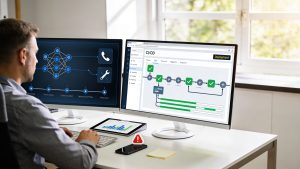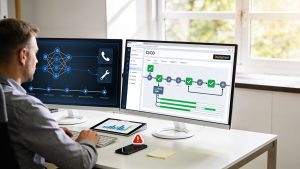In a groundbreaking move set to revolutionize the DevOps landscape, JFrog and GitHub have announced a comprehensive partnership aimed at integrating their respective platforms. This collaboration, unveiled on May 29, 2024, promises to streamline software development processes and enhance security measures across the entire software supply chain.
Key Features of the Partnership
Seamless Integration
The alliance will enable native bi-directional linking between source code in GitHub repositories and built packages stored in JFrog platforms. This integration is designed to provide developers with a unified view of their projects, facilitating easier navigation and traceability between source code and binaries.
AI-Powered Development
A significant aspect of this partnership is the integration with GitHub Copilot, a cutting-edge generative AI framework based on large language models (LLMs) developed by OpenAI. This integration aims to leverage artificial intelligence to enhance coding efficiency and productivity.
Enhanced Security Measures
The collaboration will focus on improving security throughout the software development lifecycle. JFrog CTO Yoav Landman emphasized that this partnership will make it simpler for organizations to implement best DevSecOps practices declaratively.
Future Developments
Dynamic SBOM Generation
In the coming months, JFrog and GitHub plan to provide full security posture visibility from source code to production environments. This advancement will simplify the dynamic generation of Software Bills of Materials (SBOMs), crucial for maintaining transparency and security in software supply chains.
Unified Project Management
The partnership will introduce integrated single sign-on capabilities, allowing DevOps teams to more easily unify projects across multiple platforms. This feature is expected to significantly improve the security of software supply chains.
Impact on the DevOps Landscape
Standardization of Workflows
Landman noted that this alliance signifies the end of the “Wild West” era in software development. Organizations are increasingly standardizing on platforms that simplify DevOps workflows, thereby reducing risks associated with building and maintaining applications.
AI-Driven Transformation
The partnership comes at a time when AI is poised to fundamentally alter software development and deployment processes. Both JFrog and GitHub are expected to incorporate a range of generative AI capabilities into their platforms, making it easier for DevOps teams to build, deploy, and manage secure applications at an unprecedented scale.
Implications for Organizations
Democratization of DevOps
As AI capabilities become more prevalent in DevOps platforms, the barrier to entry for organizations looking to embrace DevOps practices is expected to lower significantly. This democratization could lead to a substantial increase in the number of organizations able to build and deploy custom applications.
Competitive Advantage
Organizations that quickly adapt to these AI-enhanced DevOps platforms may gain a significant competitive edge. The ability to build, deploy, and update software faster could become a crucial differentiator in the market.
Scaling Application Development
With AI-infused platforms, the constraints on the number of applications an organization can deploy may be significantly reduced. This could lead to a dramatic increase in the size of codebases that DevOps teams need to manage.
Challenges and Opportunities
Skill Set Evolution
As AI takes on more complex tasks in software development, the required skill set for DevOps professionals is likely to evolve. Teams may need to focus more on strategic oversight and AI management rather than traditional coding tasks.
Workflow Re-engineering
Organizations are advised to start re-engineering their workflows now to eliminate existing bottlenecks. This proactive approach will help teams prepare for the anticipated increase in code generation driven by AI.
Conclusion
The JFrog-GitHub alliance represents a significant milestone in the evolution of DevOps. By combining their strengths and integrating AI capabilities, these industry leaders are paving the way for more efficient, secure, and scalable software development processes. As the partnership unfolds, it will be crucial for organizations to adapt their strategies and workflows to harness the full potential of these advancements in the rapidly changing landscape of software development.
Read more such articles from our Newsletter here.



